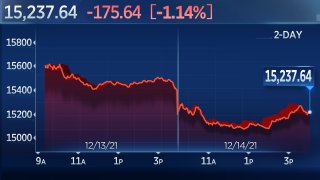
U.S. stocks fell on Tuesday as some large tech stocks moved lower and new inflation data continued to show a sharp rise in prices.
The Nasdaq Composite led the decline, falling 1.14% to 15,237.64. The S&P 500 slid 0.75% to close at 4,634.09. The Dow Jones Industrial Average held up better than its counterparts but still fell 106.77 points, or 0.30%, to 35,544.18.
Tech stocks were a main source of weakness on Tuesday, though the sector trimmed its losses in afternoon trading. Microsoft was a major drag on the market averages, falling 3.2%. Fellow software stock Adobe dropped 6.6%.
Get Tri-state area news and weather forecasts to your inbox. Sign up for NBC New York newsletters.
Elsewhere, automaker Ford slid nearly 1.9% following news that by 2030 Toyota would be investing $35 billion into battery-powered electronic vehicles, a space in which Ford has sought to establish itself as a leader. Tesla shares fell 0.8% after filings with the Securities and Exchange Commission revealed that CEO Elon Musk sold another $906.5 million in shares.
Shares of Netflix, Apple and Amazon all ended the session in negative territory as well.
"The large cap names are now starting to fall by the wayside, which is exactly what happened in 2018, the last time we had sort of that rolling correction idea," Morgan Stanley chief investment officer Mike Wilson said on CNBC's "Halftime Report."
Money Report
The down day on Wall Street followed the November reading for the producer price index showing a year-over-year increase of 9.6%, the fastest pace on record and above the 9.2% expected by economists, according to Dow Jones. The index rose 0.8% month over month, above the 0.5% expected.
The hotter-than-expected inflation reading comes as the Federal Reserve also kicks off its two-day meeting on Tuesday. The central bank will release a statement on Wednesday with quarterly projections for the economy, inflation and interest rates. Chairman Jerome Powell will also hold a press conference.
Investors will be watching closely this week for commentary around if the Fed plans to accelerate the end of its bond-buying program. At present, the central bank's asset purchase program will end in June 2022, but several officials have spoken about ending the purchases sooner.
The latest CNBC Fed Survey showed that investment professionals and economists expect the Fed to wind down its asset purchases by March and begin rate hikes in June.
Wolfe Research strategist Chris Senyek said in a note to clients on Tuesday that the Fed will need to walk a fine line to avoid spooking the markets.
"Fed Chair Powell has a very difficult communication job ahead of him tomorrow afternoon. We're in line with consensus and expect the Fed to end its tapering program in March/April and start hiking in May," the note said. "If Fed Chair Powell emphasizes that the FOMC remains flexible, the 'Fed put' should remain in place. However, if his tone is overly hawkish, it could turn into a disaster like December 2018."
On the positive side for the market, major bank stocks rose along with interest rates, with Goldman Sachs and Bank of America each adding more than 1%. Regional banks also outperformed.
On the Covid front, Pfizer announced that its drug aimed at treating patients with the virus proved effective in a final analysis, including against the new omicron variant. However, the World Health Organization warned on Tuesday that the new variant appeared to be spreading faster than previous versions of the virus.
Tuesday's moves marked a second straight down day for Wall Street. However, the Dow and S&P 500 are still within ghly 3% of their intraday record highs. The Nasdaq is about 6% below its high-water mark.






